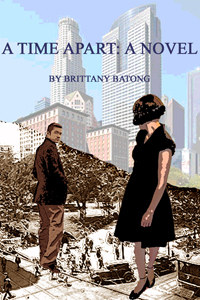The past was the only place their love could exist.
Kara, a twenty-something art school graduate has resigned herself to contentment in the routines of everyday family life as a commuting suburbanite. An unexpected attraction to Jake, a slacker-colleague in her office, is further complicated when a visit to a lavish old movie palace initiates a journey into the past. Kara and Jake inexplicably find themselves thrown into the turbulence of Los Angeles during the Great Depression, maintaining a feigned marriage as inhabitants of a boarding house in a forgotten community of Los Angeles called Bunker Hill.
As partners in a past that is both exciting and adversarial, Jake and Kara begin to develop very real romantic feelings for one another, even as they are bound to identities in a time that does not yet exist.A Time Apart follows two people as they discover a Los Angeles beyond their separate lives, beyond all comprehensible experience, and beyond that which is real or imagined.
Preface: 2011
Sometimes I walk around downtown, imagining it not as this Los Angeles, but as our Los Angeles. My mind strips away the high-rises and the mirrored glass, isolating what is left of the city that we knew, surrounding it with the familiar places we walked; supplementing the self-absorbed professionals of the Financial District (who seem to me to talk to themselves but really into their hands-free devices) with instead the department stores and proprietors of “Art Lane”, defying the assumptions of the highbrow set, making statements and movements with their thoughts and their art. What would they think of this overly polished place their world has become?
I wander to 6th Street, seeing not the jumbled mix of cheap eateries and plain façades, but the warm bookshops burgeoning with poetry and compatriots; imagining the streets not with orange Metro buses and blue DASH buses, but instead with red and yellow cars that sail past on their cable connections, Delia reaching out to grab them, her laughter ringing in my ears.
And then I think of Jake, my mind carrying me to all the places we walked that first day. Sometimes I retrace our steps from the Theatre District, with its treasure trove of lavish movie palaces, to Pershing Square, where my reverie allows me to push away the gaudy concrete and primary colors of a park redesign gone wrong; and instead see the trees and grass of that other Los Angeles. My eyes continue to the grand old Biltmore Hotel, still as proud and dignified as it was and now somewhat out of place, and I smile as I think of that first night. If only I could dream vividly enough, I could bring to life the steep incline up Olive Street to Bunker Hill and find my way home to our old Victorian, up the concrete steps and through the creaky porch, into the parlor where our friends gather, spinning records on the old Victrola while I trip on the back step as Jake tries to waltz me around the room. My heart begins to throb in my throat and tears sting at my eyes.
But on I walk, as if it is the only way to keep those memories real.
It is when the memories are their most vivid that I chance upon a group of colleagues, who smile at me and say “hello”. I smile back but resent this invasion, this reminder that the place we knew is no longer here. That place, that life that we lived before us, before now, is gone forever. I am completely alone in its dreamlike memory, my profound grief unspoken, my loss without a voice, strangled at the back of my throat, a silent cry: unutterable.


